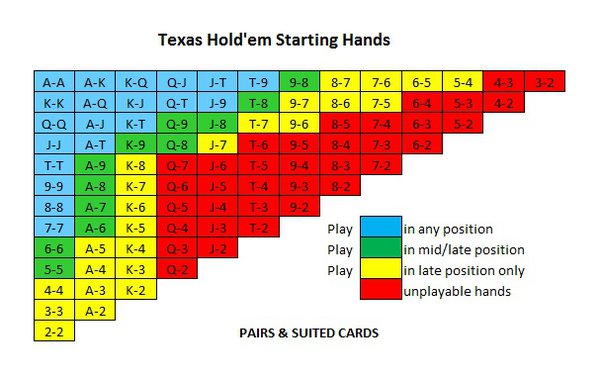Introduction to Poker
This timeless game, with its roots in the American Wild West, has evolved into various forms like Texas Hold’em, Omaha, and Seven-Card Stud. Each variant offers a unique twist, but they all share the core principles of poker.
In this guide, “Mastering Poker: A Comprehensive Guide for Beginners,” we aim to demystify the world of poker for newcomers. Whether you’re sitting down at the table for the first time or seeking to refine your play, this article offers a step-by-step walkthrough of the basics, from understanding the rules and hand rankings to mastering beginner strategies. Join us as we navigate the exciting world of poker, helping you evolve from a novice to a confident player ready to make your mark at the table.
1. Understanding the Basics of Poker
Poker, a game of wit and strategy, has various forms, each with its unique flair. However, the core of poker remains consistent across these variants. This section will introduce you to the foundational elements that are common in most poker games, providing you with the necessary groundwork to start your poker journey.
Poker Variants: While there are many poker variants, the most popular ones include Texas Hold’em, Omaha, and Seven-Card Stud. Texas Hold’em is often the go-to choice for beginners due to its straightforward rules and widespread popularity. Omaha, while similar to Hold’em, requires players to make the best hand using exactly two of their four hole cards and three of the five community cards. Seven-Card Stud, a classic variant, does away with community cards altogether and challenges players with individual hands comprising seven cards, three of which are dealt face down.
Basic Rules: The general rules of poker are simple yet profound in their strategic depth. A standard poker hand involves several betting rounds where players bet chips based on the strength of their cards. The objective is to either have the best hand at the showdown or to bet in a way that convinces your opponents to fold, thereby winning the pot without needing to reveal your hand. Most poker games involve a combination of face-up and face-down cards, with the exact distribution varying by variant.
Hand Rankings
Understanding hand rankings is crucial in poker. Here’s a quick rundown from highest to lowes
- Royal Flush: The highest possible hand, consisting of A, K, Q, J, 10, all of the same suit.
- Straight Flush: Any five consecutive cards of the same suit.
- Four of a Kind: Four cards of the same rank.
- Full House: A combination of three of a kind and a pair.
- Flush: Any five cards of the same suit, not in sequence.
- Straight: Five consecutive cards of different suits.
- Three of a Kind: Three cards of the same rank.
- Two Pair: Two different pairs.
- Pair: Two cards of the same rank.
- High Card: When you haven’t made any of the hands above, the highest card plays.

In the following sections, we will dive deeper into the intricacies of poker, including how to start a game, the dynamics of betting, and beginner strategies. This foundational knowledge will set you up for success, whether you’re playing casually with friends or aiming for higher stakes.
2. Getting Started with Poker
Now that you’re familiar with the basics of poker, it’s time to delve into how to get started with this captivating game. This section will guide you through setting up a poker game, understanding the flow of the game, and the fundamental betting basics.
Setting Up: To begin, you’ll need a standard deck of 52 cards and poker chips. The number of chips will depend on the number of players and the type of game you’re playing. Each player buys in for the same amount, receiving chips that represent their stake in the game. Designate a player to be the dealer, or use a dealer button to rotate the role clockwise after each hand. The dealer is responsible for shuffling and dealing the cards, as well as managing the betting rounds.
The Flow of the Game
A typical game consists of the following stages:
- The Deal: Each player receives their cards, dealt one at a time, starting from the player to the left of the dealer. The number and position of face-up and face-down cards vary depending on the poker variant.
- Betting Rounds: After the deal, players enter into betting rounds. Texas Hold’em and Omaha have four rounds of betting – pre-flop, flop, turn, and river. Seven-Card Stud has five. In each round, players have the option to bet, call, raise, or fold based on their cards and the actions of other players.
- The Showdown: After the final betting round, if more than one player remains, there is a showdown. Players reveal their cards, and the best hand, according to the hand rankings, wins the pot.
Betting Basics
Understanding betting is crucial in poker. The main actions include:
- Blinds and Ante: Games like Texas Hold’em use blinds (small and big blinds), mandatory bets to start the action and build the pot. Other games might use an ante, a small bet contributed by each player before the hand begins.
- Call: Matching the current bet to stay in the hand.
- Raise: Increasing the bet amount, forcing others to commit more to stay in the hand.
- Fold: Surrendering your hand and exiting the round if you believe your hand isn’t strong enough to win.
- All-In: Betting all your remaining chips. This is a high-stakes move, often seen in tournaments or dramatic moments.
Understanding these fundamental aspects of poker setup and gameplay is key to starting your poker experience. The next section will explore basic strategies and tips to help you play smarter and improve your chances of winning.
3. Strategies for Beginners
Entering the world of poker can be exciting, but it’s crucial to arm yourself with strategies to play effectively. This section is designed to help beginners navigate the strategic landscape of poker, focusing on starting hands, positional play, and reading opponents.
Starting Hands: Your journey in a poker hand begins with the cards you’re dealt. In games like Texas Hold’em and Omaha, your starting hands are pivotal. As a beginner, it’s advisable to play conservative and stick to strong starting hands. For instance, in Texas Hold’em, high pairs (like Aces, Kings, Queens) and high suited connectors (like A-K or Q-J of the same suit) are considered strong hands. Playing fewer but stronger hands will help you avoid difficult decisions post-flop and increase your chances of winning the hands you choose to play.
Position and Play: Your position at the table significantly influences your strategy. Being in a ‘late’ position (like the dealer or right to the dealer) is advantageous as you get to act after most other players. This position allows you to observe others’ actions before making your decision, giving you more information to work with. Conversely, in an ‘early’ position, play more cautiously, as many players will act after you, and you have less information on their hands.
Reading Opponents: One of the most crucial skills in poker is the ability to read your opponents. Pay attention to their betting patterns, body language, and even their hand movements. For example, a player who bets aggressively might be bluffing, while one who hesitates before raising could have a strong hand. Remember, poker is not just about the cards you hold; it’s equally about playing the players.
Betting Strategy
The way you bet can speak volumes about your hand. Betting aggressively with a strong hand can maximize your winnings, but occasionally mixing up your play (like slow-playing a strong hand) can keep opponents off-balance. However, be cautious with bluffing; while it’s an essential part of poker, overuse or predictability in bluffing can turn it into a liability.
Managing Your Bankroll: A key aspect often overlooked by beginners is bankroll management. Only play with money you can afford to lose, and avoid moving to higher stakes until you’re consistently winning at your current level.
Conations Learning: Lastly, be open to learning. Poker is a game of skill, and continuous improvement is essential. Analyze your play, learn from mistakes, and always look for ways to refine your strategy.

By focusing on these fundamental strategies, you can set yourself up for a more successful and enjoyable poker experience. The next section will delve into the nuances of poker etiquette and advanced tips to further enhance your game.
Advanced Tips
- Adapt Your Strategy: Be flexible with your strategies. What works in one game might not work in another. Adapt based on the game dynamics and the types of opponents you’re facing.
- Mental and Physical Fitness: Maintain good physical and mental health. Poker requires concentration and emotional control, which are at their peak when you’re physically and mentally fit.
Incorporating these etiquette tips and advanced strategies into your game will not only make you a more respected player but also enhance your overall poker experience. As you continue to evolve in your poker journey, remember that respect, continuous learning, and adaptability are key to long-term success and enjoyment in the game.
Conclusion
As we wrap up our comprehensive guide, “Mastering Poker: A Comprehensive Guide for Beginners,” it’s clear that poker is much more than a game of cards; it’s a strategic, psychological, and at times, an emotional journey. From understanding the basics of various poker variants and mastering the initial setup to developing beginner strategies and adhering to poker etiquette, we’ve covered the essential aspects that lay the groundwork for becoming a proficient poker player.
Poker is a game that beautifully balances skill and luck, strategy and intuition. Remember, every hand you’re dealt is a new opportunity to apply the principles and strategies discussed. Whether you’re playing casually with friends or aiming for more competitive stakes, the key to success in poker lies in patience, continuous learning, and adapting your play to the ever-changing dynamics at the table.
Always play responsibly and within your limits, both financially and emotionally. Poker offers a rewarding experience when approached with the right mindset and respect for the game and its participants. The world of poker is vast and ever-evolving, and there’s always something new to learn, a strategy to refine, or an opponent to understand.
We hope this guide serves as your stepping stone into the intriguing world of poker. Embrace the challenges, enjoy the process, and may your journey through the fascinating world of poker be as rewarding as it is thrilling. Remember, in poker, as in life, the journey is as important as the destination. Good luck and happy playing!
Here is a selection of top-rated casinos that offer an impressive variety of poker to enjoy: 22Bet Casino, 1xBet Casino, Betwinner Casino , Viggoslots Casino, Playfina Casino, King Billy Casino, Mozzart Casino, Pin-up Casino & 20 Bet Casino.













